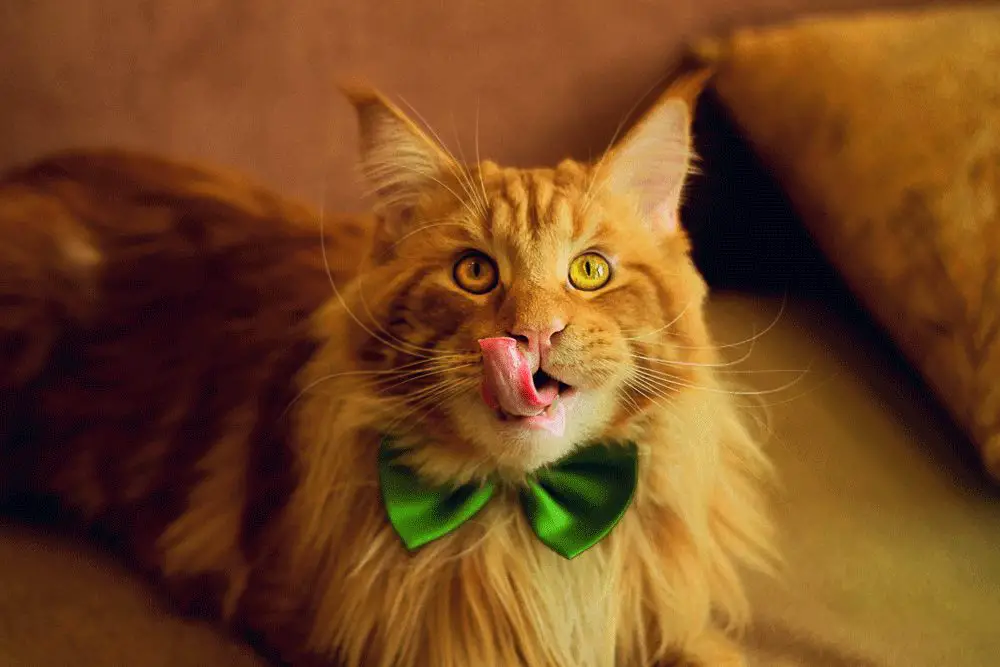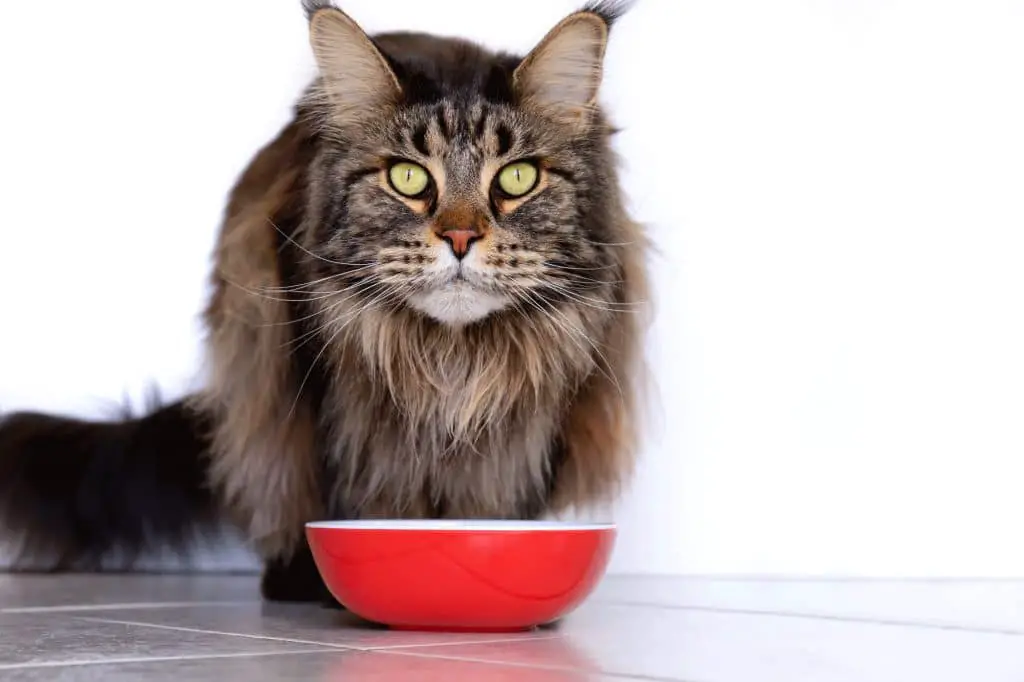Providing a healthy, balanced diet for your Maine Coon is essential is helping them live a long and happy life, so it’s not unusual for any Maine Coon owner to become concerned when their eating habits stray from the norm. There are a few good reasons why your Maine Coon might be hungry all the time, some of which can be solved with a few toys, and others that will require a visit to the veterinarian.
1. Hyperthyroidism
Hyperthyroidism is when the thyroid gland produces too much hormone, increasing the metabolism of your Maine Coon. This means their body consumes way more energy than normal, causing them to be hungry all the time. Of course, this is not to be taken lightly because it can cause all sorts of other issues, including:
- Increased thirst or urination
- Vomiting
- Diarrhea
- Dry coat
- Hyperactive behavior
- Heart murmurs or arrhythmia
A vet can diagnose hyperthyroidism by feeling for an enlarged thyroid gland and taking some blood tests.
While some cases of hyperthyroidism are completely outside of your control, in some instances the disorder can be caused by too much iodine in your Maine Coon’s diet. Ask your vet for some recommendations on iodine-restricted foods you can get for your Maine Coon.
2. Diabetes
We’ve all heard of this disease before, and cats can get it too. Diabetes prevents your Maine Coon from utilizing all the glucose (sugar) they’re eating because they’re body does not produce enough insulin. Because they cannot use this energy, they will lose weight and feel hungry all the time.
One of the classic signs of diabetes in cats is losing weight while still feeling hungry all the time and eating a lot of food. Cats will diabetes will also urinate more and seem more thirsty. All three of these signs together is a strong indication of diabetes and should warrant a trip to the vet.
3. Bowel Problems
Irritated bowels can cause changes in your Maine Coon’s eating habits, including seeming hungry all the time. This can be caused by inflammatory disease or an intestinal cancer like lymphoma.
The irritated bowels are likely not allowing your Maine Coon to absorb all their food, causing them to want to eat more to make up for it.
A blood test or ultrasound at the vet can diagnose certain intestinal problems, and the treatment varies greatly depending on the bowel issue.
4. Worms
Intestinal worms can cause your Maine Coon to feel hungry all the time because they will consume a lot of the nutrition your Maine Coon is eating instead of their host. Worm infestation is a lot more likely in outdoor cats because they can pick up parasites from contaminated water or stray animals.
Worm infestations are a big cause for concern not only because it can cause malnutrition in your Maine Coon, but also because some worms, such as roundworms, can be transmitted to humans.
Your vet will be able to test for worms with a fecal sample from your Maine Coon and, if necessary, treat with some medication.
5. Your Maine Coon Just Needs More Food

Maine Coons are one of the largest cat breeds out there and undoubtedly larger than most house cats. To a lot of owners unused to having such a large cat, the amount they need to eat to sustain their larger size might seem unusual even when it’s completely normal. If your Maine Coon is always hungry, it might be that they just need a bit more food. Take a look at this Maine Coon feeding chart to find the right amount of dry and wet food you should be feeding them based on their weight.
6. Boredom
Boredom in cats is underrated, especially in very social breeds like Maine Coons. Like humans, Maine Coons will overeat simply because they have nothing better to do.
If you’re busy a lot and not home often it might be a good idea to provide your Maine Coon with another kitty companion. Maine Coons are particularly social cats, and have even been described as “dog-like” in their need for interaction. They’re simply high maintenance in this way, and need to have a friend around more often than other cats.
Try providing more toys that do not require your interaction such as battery-powered mice or toys that move erratically when your Maine Coon touches them. If you prefer to always have a supply of food available all day you can put it in a puzzle toy that require them to work to get it out.
7. Your Maine Coon’s Food Lacks Nutrients
Overeating isn’t just caused by lack of calories, but also lack of nutrients. Your Maine Coon’s body will signal for them to eat more to try to obtain the necessary amounts of vitamins and minerals if they don’t have enough, causing them to seem hungry all the time.
Dry foods are often a big culprit here because they are high in carbohydrates and fillers and relatively low in nutrients. Try substituting some of the dry food with wet food each day (take a look at this food chart to see how much of each you should be feeding).
8. Age
Your Maine Coon won’t necessarily have the same amount of hunger at every phase in their life. Kittens need a lot more food to sustain their rapid growth and high energy levels, and your breeder or vet should be able to provide good recommendations on diet for your Maine Coon kitten.
Older Maine Coons might also have a harder time digesting certain nutrients such as fat and protein, causing them to eat more to try to get adequate amounts in their body. This typically happens around 13 years of age, but varies largely depending on the cat.
9. Pancreatic Disease
The pancreas secretes digestive enzymes to help break down food after a meal, but cats with exocrine pancreatic insufficiency (EPI) don’t secrete as much of these enzymes, causing them to absorb less of their food. Because they’re not absorbing as much of the food they’re eating, the Maine Coon will seem hungry all the time.
Other symptoms of this disease are
- Vomiting
- Severe diarrhea
- Greasy stools
- Weight loss
- Unkempt coat
In general, diarrhea that lasts longer than 2-3 days is a cause for concern alone, and should require a visit to the vet. Blood tests will be able to determine if your Maine Coon has EPI and treatment will include powdered digestive enzymes with each meal.














